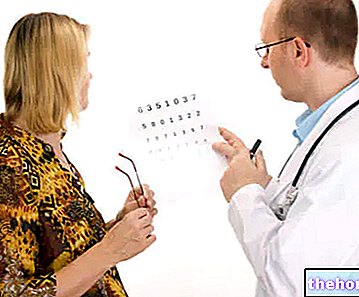Definition
Pericarditis is an inflammatory disease that affects the pericardium, that is, it affects the membrane whose job is to envelop, support and protect the heart.
Pericarditis can occur both in acute form (characterized by rapid development) and in chronic form (characterized by slower development).
Causes
The triggering factors of pericarditis can be many but, in some cases, the cause is not known and we therefore speak of idiopathic pericarditis.
Among the main causes triggering pericarditis, we remember viral, bacterial or fungal infections, autoimmune diseases (in particular, rheumatoid arthritis, systemic lupus erythematosus and scleroderma), renal failure, tumors (especially metastatic ones) , thoracic radiotherapy, chest trauma and heart attack.
Symptoms
The classic symptom of pericarditis is chest pain very similar to what you feel during a heart attack. Other symptoms that can occur in individuals with pericarditis are palpitations, tachypnea, asthenia, dysphagia and hiccups.
In the event that pericarditis is of infectious origin, fever, sweating and chills may also appear.
Pericarditis Information - Pericarditis Drugs and Treatment is not intended to replace the direct relationship between health professional and patient. Always consult your doctor and / or specialist before taking Pericarditis - Medicines and Treatment of Pericarditis.
Medicines
The drugs most commonly used in the treatment of pericarditis are non-steroidal anti-inflammatory drugs (thanks to their analgesic and anti-inflammatory properties) and colchicine, followed by opioid analgesics and corticosteroids.
The further pharmacological treatments that can be undertaken vary according to the triggering cause of the pericarditis. For example, if the pathology is caused by an infection (viral, bacterial or fungal), the most suitable drugs will be used to counteract the microorganisms responsible for its onset.
Surgery, on the other hand, is reserved only for very severe cases of pericarditis accompanied by complications.

The following are the classes of drugs most used in the therapy against pericarditis and some examples of pharmacological specialties; it is up to the doctor to choose the active ingredient and dosage most suitable for the patient, based on the severity of the disease, the state of health of the patient and his response to treatment.
NSAIDs
NSAIDs are among the first choice drugs used in the treatment of pericarditis. They are used by virtue of their anti-inflammatory properties (they burn the pericardium) and, at the same time, analgesic.
The non-steroidal anti-inflammatory drugs most used in the treatment of pericarditis are:
- Ibuprofen (Brufen ®, Moment ®, Nurofen ®, Arfen ®, Actigrip fever and pain ®, Vicks fever and pain ®): Ibuprofen is available in different pharmaceutical formulations suitable for different routes of administration. When administered orally, the drug dose used should not exceed 1,200-1,800 mg of active ingredient per day. The exact dosage of the drug must be established by the physician on an individual basis, according to the intensity of pain and according to the conditions of each patient.
- Acetylsalicylic Acid (Aspirin ®, Alkaeffer ®): Acetylsalicylic acid is available for oral and parenteral administration.
When administered orally, the dose of drug usually used in adults ranges from 325 mg to 1,000 mg, to be taken 2-3 times a day.
If acetylsalicylic acid is administered parenterally, however, the dose usually used in adults is 500-1,000 mg, to be administered intravenously or intramuscularly, every 6, 8, or 12 hours.
However, the exact amount of drug to be taken and the route of administration must be determined by the doctor.
Colchicine
Colchicine (Colchicina Lirca ®) is a drug that is normally used in the treatment of gout. However, it has also been shown to be useful for the treatment of pericarditis.
Colchicine can be used to treat this pathology as it is able to exert a very powerful anti-inflammatory action, acting directly on the cells of the immune system that trigger inflammation.
Colchicine is effective in both reducing symptoms and preventing relapses and can be given alone or in combination with NSAIDs.
The dose of drug to be administered for the treatment of pericarditis must be determined by the doctor.
Corticosteroids
Steroidal anti-inflammatory drugs are not a first-line treatment of pericarditis and are used only if NSAID and / or colchicine treatment has failed. This is due to the serious side effects that corticosteroids can cause, especially when used for long periods of time.
Among the steroidal anti-inflammatories that can be used in the treatment of pericarditis, we mention methylprednisolone (Urbason ®, Medrol ®, Solu-Medrol ®). When administered orally, the dose used can vary from 4 mg up to 48 mg of active ingredient per day. The initial quantity of drug to be administered must be established by the physician, according to the severity of the inflammation and the patient's condition. Subsequently, the dose can be modified and adjusted according to the patient's response to therapy.
Opioid analgesics
Similarly to what happens with corticosteroids, treatment with opioid analgesics is also not among the first-line treatments for pericarditis, due to the side effects that these drugs can cause (including tolerance and physical and psychological dependence). Their use is, in fact, reserved for cases of pericarditis characterized by very intense pain.
Among the opioid analgesics that can be used, we mention:
- Tramadol (Contramal ®): Tramadol is available for oral, rectal or parenteral administration. Usually, the starting dose administered is 50-100 mg, depending on the severity of the pain afflicting the patient. However, if deemed necessary, the doctor may decide to increase the amount of tramadol administered.
In any case, the maximum dose of 400 mg of the drug per day should not be exceeded. - Codeine (Codamol ®, Co-Efferalgan ®, Tachidol ®): For the treatment of pain, codeine is administered orally and is often found in pharmaceutical formulations in combination with paracetamol. The dose of codeine to be administered will be determined by the doctor, according to the intensity of the pain afflicting the patient and according to his age.
Antibiotics, antivirals and antifungals
Therapy based on antibiotics, antivirals or antifungals is implemented only when pericarditis is caused, respectively, by bacteria, viruses or fungi. In this regard, it is very important to identify the pathogen that sustains the infection, in order to prescribe the specific treatment best suited to the patient to combat that particular type of microorganism.




























